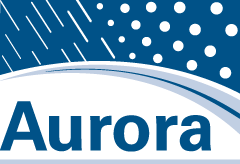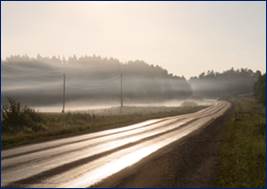Aurora eNews – Spring 2011
Up Front
New Projects for 2011
Third Peer Exchange
The objective of this project is to conduct a national winter maintenance meeting for Aurora, Clear Roads, SICOP, PNS and the FHWA to share research results from the Peer Exchanges held in 2007 and 2009, get updates from each snow-belt state, and discuss other issues related to winter snow removal operations.
RWIS Training Tool
This project involves the creation of a supervisor evaluation tool which can measure a supervisor’s ability to incorporate RWIS and risk management into their decision making process.
Benefit/Costs and Instruction for Migrating to Open RWIS
The objective of this project is to create a do-it-yourself guide for RWIS sensors, servers, data bases, web displays, etc.
Study of MDSS Costs
The objective of this effort is to determine the upfront costs vs. long-term benefits for implementing MDSS systems. Also, determine necessary equipment, how to best equip the trucks, and quantify secondary benefits of equipping the fleet for MDSS.
Funding Sources Identification
This project will compile potential funding sources and approaches that state department of transportation agencies can tap to fund the road weather management program. This would include funding partnerships, grants, standard allocations, and shared cost opportunities.
2011 Peer Exchange
Aurora will be co-sponsoring a third National Spring Maintenance Peer Exchange on September 20-22, 2011, in Bozeman, Montana. The first exchange was held in Columbus, Ohio in 2007 and the second held in Madison, Wisconsin in 2009. These events have been held in response to the need to bring state DOT snow and ice control experts and the public sector providing services, equipment, and materials together to share information, network on snow and ice control related issues, and develop research problem statements.
Other sponsors of this event include Clear Roads, the FHWA, the AASHTO Snow and Ice Pooled Fund Cooperative Program (SICOP), and the Pacific Northwest Snow Fighters. These research organizations were included in the discussions so they would better understand where the knowledge, technology, and communication gaps existed so strategies could be developed to bridge those gaps.
A website was created for the peer exchanges and has been updated several times to document the progress made on the 53 research needs statements that the 2007 and 2009 Peer Exchange attendees identified. The “2007 and 2009 National Spring Maintenance Peer Exchange Final Reports” are also posted on the website. Each final report contains a summary of the evaluation forms completed by the attendees. In fact, ninety-five percent said they would be interested in attending a future peer exchange meeting.
For more information, contact Lee Smithson, 515-239-1519, leland.smithson@dot.iowa.gov.
Upcoming Events
Aurora Board Web Meeting
When: February 10, 2011 at 1:00 pm (CST)
For more information, contact Chris Albrecht, 515-294-7684
Aurora Board Meeting
When: March 8-10, 2011
Where: Boulder, Colorado
For more information, contact Chris Albrecht, 515-294-7684
Agency Highlight
Nevada DOT
Weather information systems are important all year round in maintaining safe travel conditions for freeways and roadways. Nevada has realized the overwhelming importance of road weather information and has worked with Aurora since 2008 in hopes of gaining some valuable knowledge to improve their RWIS and Road Weather Information Programs.
“We felt like it would be a tremendous learning experience to join a group of RWIS and Road Weather experts, such as the Aurora Pooled Fund Group” says Bill Hoffman of the Nevada DOT.
So far, Nevada DOT has learned a great deal about RWIS Operations and Maintenance Procedures through its partnership with Aurora and the knowledge they have gained through this has helped them develop an effective RWIS Program. Bill Hoffman says, “The benefits from joining this group are numerous”.
Nevada continues to look to Aurora for advice and guidance in their RWIS programs as well as working with neighboring states in creating and maintaining winter maintenance data sharing and linking their operations across state lines.

